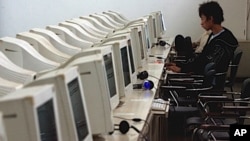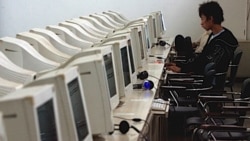Freedom of expression is a fundamental human right. Article 19 of the Universal Declaration of Human Rights states that “everyone has the right to freedom of opinion and expression; this right includes freedom to hold opinions without interference and to seek, receive and impart information and ideas through any media and regardless of frontiers.”
These rights, which “must be respected when exercised in real space, also must be respected when exercised in cyberspace. Fundamental rights do not change with new technologies,” said Christopher Midura, Counselor for Public Affairs at the OSCE Human Dimension Seminar on Media Freedom Legal Frameworks in Warsaw, May 13-15.
Nonetheless, as Secretary of State John Kerry said, “even as technology increases the possibilities for innovative expression online, the space for free media is shrinking.”
According to Freedom House, a non-governmental organization that advocates for democracy and human rights, a number of governments have responded to user-generated on-line content by passing laws that stifle on-line speech, and mete out often severe penalties for their violation.
So for example Russia, which decriminalized defamation in December 2011, recriminalized it in July 2012. Saudi Arabia now requires that news websites and websites that carry video or audio register with the government. Any website with content regarding Sri Lanka must be registered and accredited by the government. And the Chinese government tightened controls over popular domestic micro blogging platforms and pressured key firms to more stringently censor political content and to register their users’ real names. Other governments have considered China as a model for their own new internet controls. In all, since 2011, 19 countries passed laws that negatively impact internet freedom.
“The extent to which participating States respect freedom of expression, facilitate the freer and wider dissemination of information of all kinds, and strive to ensure the safety of journalists, demonstrates the value they place on a free and independent press, and on a vibrant democracy,” said Christopher Midura.
“Civil society and the media may not always tell us in government what we want to hear, but they tell us what we need to hear, and they must be able to do so without fear. Democracy is impossible without freedom of expression and an independent media.”
These rights, which “must be respected when exercised in real space, also must be respected when exercised in cyberspace. Fundamental rights do not change with new technologies,” said Christopher Midura, Counselor for Public Affairs at the OSCE Human Dimension Seminar on Media Freedom Legal Frameworks in Warsaw, May 13-15.
Nonetheless, as Secretary of State John Kerry said, “even as technology increases the possibilities for innovative expression online, the space for free media is shrinking.”
According to Freedom House, a non-governmental organization that advocates for democracy and human rights, a number of governments have responded to user-generated on-line content by passing laws that stifle on-line speech, and mete out often severe penalties for their violation.
So for example Russia, which decriminalized defamation in December 2011, recriminalized it in July 2012. Saudi Arabia now requires that news websites and websites that carry video or audio register with the government. Any website with content regarding Sri Lanka must be registered and accredited by the government. And the Chinese government tightened controls over popular domestic micro blogging platforms and pressured key firms to more stringently censor political content and to register their users’ real names. Other governments have considered China as a model for their own new internet controls. In all, since 2011, 19 countries passed laws that negatively impact internet freedom.
“The extent to which participating States respect freedom of expression, facilitate the freer and wider dissemination of information of all kinds, and strive to ensure the safety of journalists, demonstrates the value they place on a free and independent press, and on a vibrant democracy,” said Christopher Midura.
“Civil society and the media may not always tell us in government what we want to hear, but they tell us what we need to hear, and they must be able to do so without fear. Democracy is impossible without freedom of expression and an independent media.”






